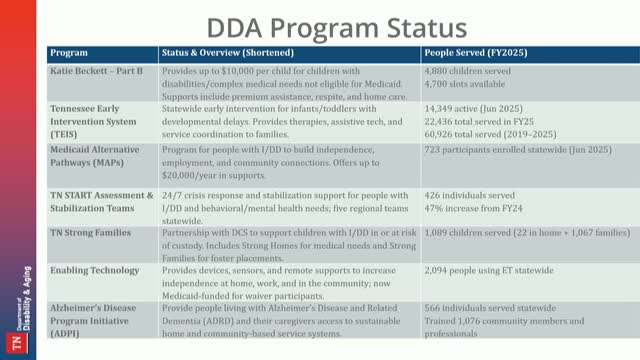Disability and Aging lists TEIS, Katie Beckett and new regional clinics; respite and senior grants expand
Get AI-powered insights, summaries, and transcripts
Subscribe
Summary
The Department of Disability and Aging reported growth in early‑intervention and Katie Beckett programs, progress on three regional seating and positioning clinics funded with ARPA, and new respite ministries and senior center grants funded after 2020 federal relief.
Tennessee’s Department of Disability and Aging (DDA) told the House Finance, Ways and Means Committee on Oct. 28 that the agency has expanded services for infants, children and people with disabilities while building three regional seating and positioning clinics using federal funds.
Program highlights presented to the committee - Katie Beckett Part B: Launched November 2020, provides premium assistance, respite and home‑based care up to $10,000 per child annually. DDA reported serving 4,880 children in 2025 and maintaining roughly 4,700 funded slots with 747 children on a waiting list. - Tennessee Early Intervention System (TEIS): Transferred from the Department of Education to DDA in 2021. DDA said it supported 14,349 active children in FY25 and has served more than 22,000 families since the transfer; the program was expanded to serve some children up to age 5. - MAPS program: Aids independence, employment and community engagement; DDA reported 1,250 slots with about 723 participants currently active. - Regional seating and positioning clinics: DDA is building three modern clinics; the West Tennessee facility is nearly complete, East Tennessee is about 40 percent complete and Middle Tennessee roughly 60 percent complete. The projects are funded with ARPA‑allocated capital funds overseen through FSAG. - Respite ministries and caregiver support: The department used state and federal funds to support roughly 35 respite ministry launches and the Alzheimer’s/dementia respite pilot that served hundreds of caregivers; DDA said the program saved an estimated $14 million in unpaid caregiver support costs. - Senior nutrition and inclusive playground grants: DDA reported grants to senior centers (over 150 sites for home‑delivered and congregate meals) and a $2.5 million initiative to support inclusive playground builds (7 projects reported).
ARPA and COVID relief use - DDA summarized CARES/ARPA funding lines that funded early‑intervention expansions, office construction and other grant pools. The department said it has administered more than 900 grants totaling over $300 million since 2020 and expects to expend nearly all ARPA capital funds for the clinics.
Questions and next steps - Committee members asked about the Katie Beckett and TEIS expansions and whether current funding is sustainable; DDA said it has worked with Finance & Administration to align rates and manage provider capacity and that growth has slowed to sustainable levels. - Lawmakers pressed DDA on outreach and awareness (for example, for Alzheimer’s respite) and DDA said communications and partnerships with local providers remain a priority.
Ending note: DDA presented a portfolio of services that rely on federal relief and state appropriations; officials said the most pressing near‑term tasks are to complete clinic construction, sustain provider rates and reach underserved rural areas with programs such as TEIS and respite services.
